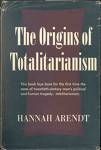The Origins of Totalitarianism

The 1951 edition
|
|
| Author | Hannah Arendt |
|---|---|
| Language | English |
| Subject | Nazism, Stalinism, totalitarianism |
| Publisher | Schocken Books |
| Media type | Print (hardcover and paperback) |
| Pages | 704 |
| OCLC | 52814049 |
| 320.53 22 | |
| LC Class | JC480 .A74 2004 |
The Origins of Totalitarianism (German: Elemente und Ursprünge totaler Herrschaft, "Elements and Origins of Totalitarian Rule"; 1951), by Hannah Arendt, describes and analyzes Nazism and Stalinism, the major totalitarian political movements of the first half of the 20th century. The book is regularly listed as one of the best non-fiction books of the 20th century.
The book describes the rise of anti-Semitism in central Europe and in western Europe in the early-to-mid 19th century; then examines the New Imperialism, from 1884 to the start of the First World War (1914–18); then traces the emergence of racism as an ideology, and its modern application as an “ideological weapon for imperialism”, by the Boers during the Great Trek (1830s–40s) in the early 19th century.
Arendt begins the book with an analysis of the rise of antisemitism in Europe, particularly focusing on the Dreyfus affair. She then discusses scientific racism, and its role in colonialist imperialism, itself characterized by unlimited territorial and economic expansion. That unlimited expansion necessarily opposed itself and was hostile to the territorially delimited nation-state. Arendt traces the roots of modern imperialism to the accumulation of excess capital in European nation-states during the 19th century. This capital required overseas investments outside of Europe to be productive and political control had to be expanded overseas to protect the investments. She then examines "continental imperialism" (pan-Germanism and pan-Slavism) and the emergence of "movements" substituting themselves to the political parties. These movements are hostile to the state and antiparliamentarist and gradually institutionalize anti-Semitism and other kinds of racism. Arendt concludes that while Italian Fascism was a nationalist authoritarian movement, Nazism and Stalinism were totalitarian movements that sought to eliminate all restraints upon the power of the movement.
...
Wikipedia
